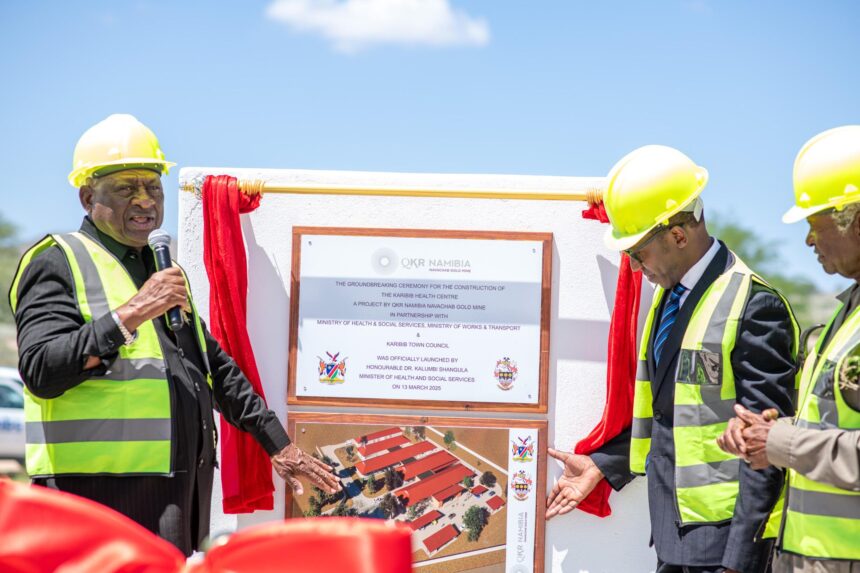Lahja Nashuuta
The QKR Namibia Navachab Gold Mine has shunned findings of a recent audit report, which reveals that the company is failing to adequately contribute to skills and technology development in Namibia’s mining sector.
The mine said it is engaging the Office of the Auditor General to clarify the report and ensure the record accurately reflects its contributions to national development.
The audit, conducted by the Office of the Auditor General, covered the period from 1 April 2020 to 31 March 2023.
It assessed the mines ministry’s regulatory oversight over three major gold mines – QKR Namibia Navachab, B2Gold Namibia and Osino Gold Exploration and Mining.
The report issued a disclaimer of opinion, citing widespread regulatory lapses and non-compliance with the Minerals (Prospecting and Mining) Act of 1992 and Namibia’s Mineral Policy. The auditors revealed that QKR Namibia failed to comply with Section 50(c) of the Act, which mandates collaboration with stakeholders to promote skills and technology transfer to Namibians. The mine reportedly did not implement or report any training programmes during the 2020/21 and 2021/22 financial years. Furthermore, both QKR and B2Gold allegedly failed to demonstrate compliance with Section 50(e), which requires mining companies to support local capacity building.
However, QKR has dismissed these allegations, asserting that it has consistently invested in skills development and community upliftment initiatives. “We categorically reject the suggestion that we have not contributed to skills transfer or local development,” said Navachab Gold Mine spokesperson Tuafi Shafombabi.
Skills development
Shafombabi said that, over the audit period, Navachab employed more than 2 300 interns, graduates and apprentices across a range of disciplines.
These include mechanical, electrical and miningengineering, geology, accounting, human resources, procurement and communication at a cost of N$17 million.
The mine has signed an agreement with several educational institutions, including the University of Namibia, Namibia University of Science and Technology, Namibian Institute of Mining and Technology as well as vocational colleges in Rundu, Zambezi, Okakarara, Valombola and Anistemi. Many of the trainees have been absorbed into the mine’s workforce.
Additionally, the mine awarded scholarships and bursaries worth N$2 million to students from disadvantaged backgrounds and invested in internal human capital programmes that have benefitted more than 500 employees.
Navachab also funded the education of employees’ children, spending nearly N$50 million since 2020 for schooling from primary to secondary levels.
Through its Golden Egg Project, Navachab disbursed N$2.5 million in 2024 to 10 small and medium enterprises from Otjimbingwe, Usakos and Karibib. The initiative offered business management training, mentorship and coaching in compliance, marketing and finance.
Shafombabi added that annual reports on corporate social investment are submitted to the mines and energy ministry.
They detail contributions to education, health, job creation, sports and infrastructure development.
Ploughing back
Shafombabi said, for the last five years, the mine injected N$5.2 million towards drilled boreholes in Zambezi, Kavango West, Ohangwena, Kunene and Omaheke.
A total of N$4.5 million was used to construct a mortuary in Otjimbingwe, while N$350 000 was used to launch a women-led gardening project in Karibib.
Moreover, N$13.7 million supported education infrastructure, including school construction and renovations across Erongo.
A total of N$3.5 million was invested in electrifying the Usab informal settlement in Karibib.
To provide vehicles to Karibib and Usakos police stations, the company spent N$2.3 million.
The company has further allocated N$20 million in 2025 toward constructing a new public medical facility in Karibib in partnership with the health ministry. For sport and expos that empower local entrepreneurs and athletes, the company invested N$10.2 million.
The audit report states that the mine failed to reduce its exploration area during license renewals. It questioned the lack of transparency around the QKR’s 92.5% multinational ownership.
In response, Navachab said all licence renewals, including waivers and area reductions, were submitted in line with the ministry’s guidelines.
The mine confirmed it has relinquished several EPLs, where exploration had concluded, to allow new entrants into the sector.
“On ownership, the company details on our ownership and beneficial interests are publicly available at BIPA and submitted to the relevant authorities as required by the Financial Intelligence Act,” Shafombabi said.
– lnashuuta@nepc.com.na


